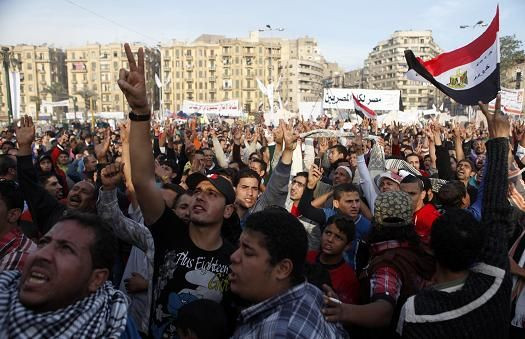Morsi's Call For Dialogue Rejected, Mocked By Opposition, Deepening Egyptian Rifts

Egyptian President Mohammed Morsi's speech on Thursday did little to alleviate the tension and violent clashes between pro- and anti-Muslim Brotherhood protesters in Cairo and across Egypt.
About 500 protesters rushed the presidential palace on Friday after security forces around its perimeter were removed in the afternoon local time, Al-Arabiya reported. A few members of the security forces were injured. Protesters told reporters that they want to "bring down the regime" and that "there will be no stability until our demands are met."
The state news agency Al-Ahram reported that the Muslim Brotherhood headquarters in Cairo was attacked for the second day in a row and torched by anti-Morsi activists. The two sides threw stones at each other.
Other peaceful rallies also occurred. An estimated 15,000 anti-Morsi protesters marched in Alexandria, and, in Cairo, 50,000 protesters attended a funeral for three of the Muslim Brotherhood supporters who died on Wednesday, Al-Ahram reported.
Morsi has still insisted on pushing through with the constitutional referendum but on Friday announced that voting for expatriates, which was to have begun Saturday, will be delayed, Al-Ahram said. Instead, he called for a dialogue that day with "legal experts and opposition figures to come up with a solution to save the nation," Al-Ahram translated.
In Morsi's televised address to the nation on Thursday evening, Morsi claimed that the peaceful protesters were "attacked by armed infiltrators" and "paid thugs." He urged restraint and offered condolences to the families of the six who died.
“Such painful events happened because of political differences that should be resolved through dialogue,” said Morsi, according to Al-Monitor. “I will never allow anyone to deliberately kill, sabotage, terrorize peaceful citizens and attempt a coup on legitimacy.”
Morsi did indicate he might be willing to compromise on the constitutional article that gives him immunity from judicial oversight, one of the issues that originally sparked the protests.
"I am not insisting on keeping Article 6 of the declaration if dialogue with political partners leads to that," Morsi said.
But the "dialogue" that Morsi proposed might expose exactly what the opposition has been claiming: that any secular and Christian voices are being shunted aside in favor of the far-right-wing Islamist majority.
"The minority should submit to the will of the majority, and everyone should cooperate for the interest of the nation," Morsi said. "Isn’t this democracy?”
Morsi's speech was met with ridicule by his opponents. Commenters on Twitter slathered on comparisons to ex-dictator Hosni Mubarak. San Francisco dweller Kaveh Gharib called Morsi "Mubarak with a beard."
Rana Kabbani, a Syrian journalist for the Guardian in the U.K., tweeted, “It would've been nice if #Morsi had refrained from using those #Mubarak-speak sentences drawn from #ArabTyrantManual." Writer Thomas R. Hart similarly tweeted, “How To Spot A Dictator: 'The people who are against me are foreign agents. It's a conspiracy'" and pointed out that Mubarak, former Libyan dictator Muammar Gadhafi and Syrian President Bashar al-Assad have all used similar language.
The opposition in Egypt refused to meet Morsi's demands for a dialogue. The National Front for Salvation of the Revoltuion, a coalition of 35 anti-Morsi groups with the goal of overturning the constitutional assembly, said they would "refuse to take part in a dialogue proposed by the president for Saturday," Al-Arabiya reported. A spokesman for the group said that "the president lost a historic chance to act like a president for all Egypt. We will continue to escalate, using peaceful means."
One person who did support Morsi's call for a dialogue was U.S. President Barack Obama. In a phone call with Morsi on Thursday, released by the White House, Obama "expressed his deep concern" about the violence of the protests. Obama also stressed that any dialogue with the opposition "should occur without preconditions."
Echoing Obama's comments was the U.N. High Commissioner for Human Rights, Navi Pillay, who said in a statement on Friday that she was "alarmed" by the "rising tension and recent deaths and injuries" during the protests. She also "welcomed" any open dialogue but pointed out several articles that concerned the UNHCR and said there had been no progress toward fixing these in the eyes of the U.N.
“The draft constitution provides guarantees to some human rights,” Pillay said in a statement. “However, there are also some very worrying omissions and ambiguities, and in some areas the protections in it are even weaker than the 1971 Constitution it is supposed to replace. I am highly concerned, for example, by the absence in the current draft of any reference to the international human rights treaties, which Egypt has ratified and is bound to uphold."
Pillay also noted the fact that the draft constitution was pushed through the Assembly and questioned the document's authority. "The haste with which the Constituent Assembly adopted the final text ... have put into question the credibility of the process and contributed to the chaos in Cairo and other cities,” she said.
“Urgent steps are needed to restore confidence in the process and in the country’s all-important new Constitution, on which so much depends.”
© Copyright IBTimes 2024. All rights reserved.






















